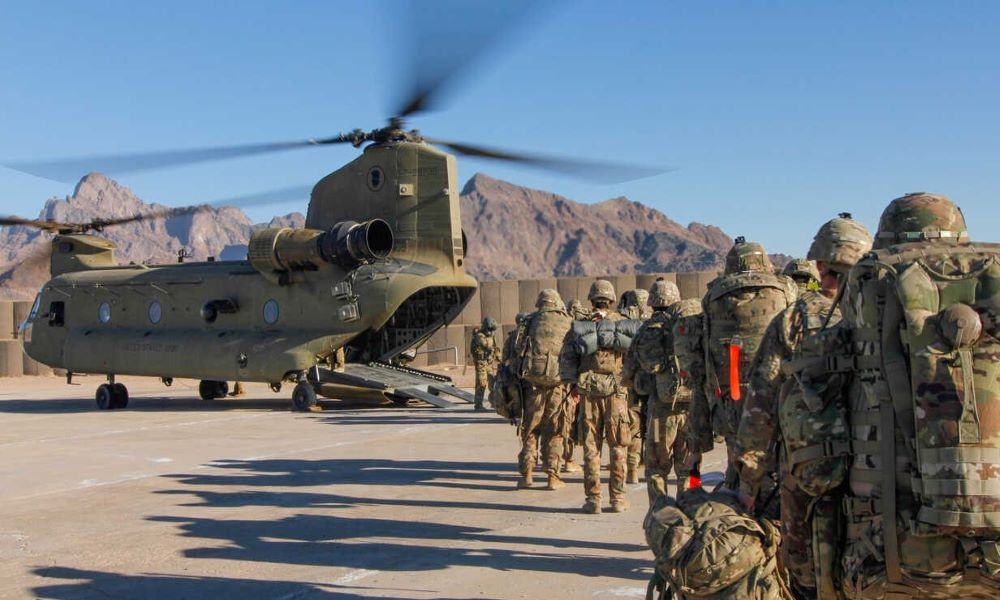US closes 10 bases as part of ‘murky’ withdrawal process

The United States has closed at least 10 military bases across Afghanistan as part of a withdrawal process “so murky” that many officials say they are uncertain of what’s to come despite a fast-approaching deadline, the Washington Post reported Saturday.
Washington’s drawdown started after the US signed a deal with the Taliban in February which did stipulate that the US had 135 days in which to close five bases as well as a full foreign military withdrawal by May next year.
Speaking to the Washington Post on condition of anonymity, Afghan and US officials confirmed that 10 bases had however been shut down.
Little is known about what remains of the bases – many of which are in the more volatile provinces in Afghanistan.
It is also unclear how much equipment — more difficult to move than people — is left at each of the closed installations, the Post reported.
In addition to the closure of bases, Afghan and US officials also stated that there was still uncertainty around the drawdown plans. Trump’s administration has said that troop levels will be reduced to about 2,500 by January 15, from around 4,000 currently.
One official told the Washington Post that there are ongoing discussions around the drawdown and that details are still being worked through on what equipment — ranging from spare vehicle parts to ammunition — needs to be sent back to the United States and what can be turned over to the Afghan government.
However, another official told the Post that despite the drawdown in people and closure of bases, the US will retain the ability to carry out airstrikes against the Taliban in defense of Afghan forces.
US troops will also remain able to carry out some counterterrorism strikes against the IS-K (Daesh) in Afghanistan.
Another US official said a number of significant decisions will be made over the next two weeks, including which other bases will close and what equipment will be turned over to the Afghan military.
He told the Washington Post these decisions will be made in consultation with NATO allies and with the Afghan government.
Speaking to the Post, Ashley Jackson, an expert on the Taliban, with the Overseas Development Institute said the closing of US bases is handing Taliban fighters symbolic and tangible victories.
“It’s the best propaganda [the Taliban] could ever have,” Jackson said, citing contacts she has close to the Taliban. “It’s the psychological effect that they are watching.”
And, as the United States closes smaller outposts that helped government forces hold territory, Jackson said the Taliban would probably move in and expand its reach.
The Washington Post meanwhile cited analysts and Afghan officials as having said further closures show that the United States is collapsing its forces in Afghanistan back into its bigger military installations to save on the large number of troops needed to secure the perimeter of multiple small outposts.
The move also brings US troops closer to medical facilities as the American footprint in Afghanistan shrinks, and would make it easier to evacuate the country rapidly if security disintegrates, the article stated.
The initial bases closed this year were Tarin Kowt in Uruzgan province, Bost in Helmand, Gamberi in Laghman and Lightning in Paktia. Others closed this year include Jones in Kunduz, DeAlencar in Nangarhar, Shaheen in Balkh, Bishop in Kabul, Maymana in Faryab, and Qalat in Zabul.
It is unclear how many bases remain open in Afghanistan, in part because the total number of military sites has not been made public.
But a senior adjunct fellow with the Center for a New American Security, who served in Afghanistan, Jason Dempsey, told the Washington Post that Trump’s decision to continue withdrawing troops from Afghanistan is “clearly such an ego and timeline-driven mood.”
Dempsey, who has frequently criticized the US military’s efforts in Afghanistan, said he believes the Afghan government is being “hung out to dry” by the US administration with the manner in which it is withdrawing.
“I don’t think we have a path to solid victory,” he said. “But I’d like to think that we had an obligation as we withdrew to our Afghan partners to at least leave them in the best position possible.”
